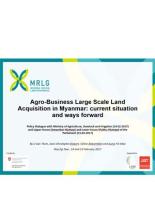Land Library Search
Through our robust search engine, you can search for any item of the over 73,000 highly curated resources in the Land Library.
If you would like to find an overview of what is possible, feel free to peruse the Search Guide.
/ library resources
Showing items 1 through 9 of 17.This presentation summarizes an on-going research in Myanmar, carried out by renowned agricultural specialist U San Thein and a team of experts, with the support of MRLG.
As the Ministry of Agriculture, Forestry, Fisheries (MAFF) aimed to finalize in the end of 2016 the draft law on agricultural lands that is currently in 6th draft, MRLG, together with other partners, has supported the NGO Forum on Cambodia to mobilize representatives of farmer organizations and C
This short video examines an initiative by Earth Systems to develop a tea sector dialogue platform that brings together key stakeholders in the value chain to jointly examine challenges and opportunities for the development of a more equitable and sustainable tea sector in Laos.
This country level analysis addresses land governance in Viet Nam in two ways.
Protected area management is threatened by weak articulation between the goals for conservation, national development and local livelihoods. This discussion note examines the competing interests for lands inside Cambodian Protected Areas and makes suggestions for policy considerations.
In Africa, the pursuit of gender equality in inheritance rights remains one of the most difficult challenges due to its entrenched patriarchal characteristics. This is also the case in the rural communities of South-Eastern Nigeria.
En el presente documento se analiza el carácter estratégico que tiene la mujer rural en relación a la agricultura y la seguridad alimentaria y la forma cómo han ido respondiendo las políticas públicas a este respecto.
The biofuel boom has become a core issue in Zimbabwean land and development debates. Biofuels require large tracts of land for production; and the land acquisition programmes by the various state, non-state actors and individuals have been termed ‘land grabbing’.
Climate change is increasingly being recognised as a global crisis, but responses to it have so far been overly focused on scientific and economic solutions. How then do we move towards morepeople-centred, gender-aware climate change policies and processes?






